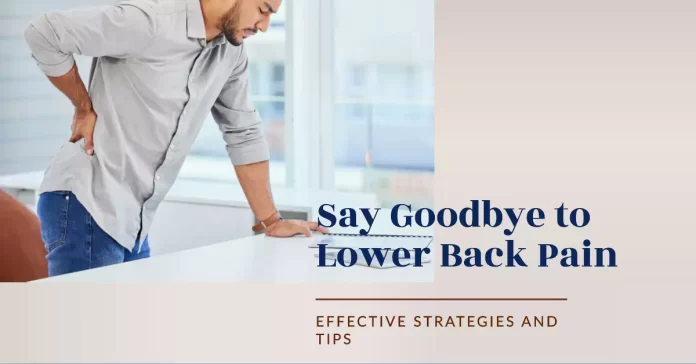If you’ve ever experienced the discomfort of lower back pain, you know how it can affect your daily life. Whether you experience a dull ache or a sharp twinge, lower back pain can render even straightforward tasks challenging. The good news is that you can employ effective strategies and tips to prevent and alleviate lower back pain. Now, let’s delve into straightforward and practical methods for keeping your back healthy and pain-free.
Here are the 10 Effective Strategies to Lower Back Pain
Maintain Good Posture
One of the primary factors contributing to lower back pain is poor posture. Slouching or hunching over can put extra stress on your back, leading to discomfort. Be mindful of your posture, whether sitting at a desk, standing, or walking. Maintain a straight back and keep your shoulders relaxed.Stay Active
Regular physical activity is a component of a healthy back. Participate in exercises that build your core muscles, like yoga or Pilates. These activities help support your spine and reduce the risk of lower back pain.Lift Properly
When lifting heavy objects, use your legs, not your back, to do the heavy lifting. Bend your knees, keep the object close to your body, and stand up straight while lifting. This technique helps protect your lower back from unnecessary strain.Ergonomic Workstations
If you have a desk job, set up your workstation ergonomically. Your chair, desk, and computer monitor should be adjusted to promote good posture. Consider using a chair with lumbar support to help maintain the natural curve of your spine.Stretch and Relax
Incorporate stretching and relaxation into your daily routine. Simple stretching exercises can relieve tension in your lower back muscles. Try exercises like the cat-cow stretch or the child’s pose to keep your back limber and pain-free.Stay Hydrated
Maintaining proper hydration is critical for preserving the health of your spinal discs. Drink enough water to keep the discs in your back adequately nourished and hydrated.Maintain a Healthy Weight
Carrying excess weight can place added stress on your lower back. Reducing this risk by maintaining a healthy weight through a balanced diet and regular exercise is the solution to preventing back pain.Sleep on a Supportive Mattress
Your mattress plays a significant role in back health. Invest in a mattress that offers proper support for your spine. Your position also matters; sleeping on your side with a pillow between your knees can help align your spine.Consider OTC Pain Relievers
Over-the-counter pain relievers like ibuprofen or acetaminophen can provide temporary relief if you’re experiencing lower back pain. However, use them as directed and consult a healthcare professional if the pain persists.Know When to Seek Professional Help
If your lower back pain is severe, persistent, or accompanied by other concerning symptoms, don’t hesitate to consult a healthcare professional. They can diagnose the root cause of your pain and suggest suitable treatments.
Final Words
Lower back pain can be prevented and relieved through strategies like maintaining good posture, staying active, and making ergonomic adjustments. A healthy lifestyle, including regular exercise and proper nutrition, is fundamental for a pain-free back.
Frequently Asked Questions (FAQs)
What are the most common causes of lower back pain?
Common causes include poor posture, muscle strain, herniated discs, and sedentary lifestyles.
How do I sustain proper posture throughout the day?
Ergonomically set up your workstation, sit with your back straight, and use lumbar support if necessary.
What types of exercises can help strengthen my core and prevent back pain?
Yoga, Pilates, and exercises focusing on your core are beneficial for strengthening the muscles that support your spine.
Are there specific stretching exercises I can do to relieve lower back pain?
Yes, exercises like the cat-cow stretch, child’s pose, and knee-to-chest stretch can provide relief.
Is it essential to stay hydrated to prevent lower back pain?
Proper hydration is essential for the health of spinal discs, so drinking enough water is recommended.
How does excess weight contribute to lower back pain, and what can I do to maintain a healthy weight?
Excess weight puts extra stress on the lower back; maintaining a balanced diet and regular exercise can help you reach and maintain a healthy weight.
What kind of mattress should I sleep on to prevent lower back pain?
A mattress that offers proper support for your spine and sleeping on your side with a pillow between your knees can be beneficial.
Are there any over-the-counter pain relievers that can help with lower back pain?
Yes, over-the-counter medications like ibuprofen and acetaminophen can provide temporary relief. Adhere to the suggested dosages and seek guidance from a healthcare professional when necessary.
When should I seek professional help for my lower back pain?
If your lower back pain is severe, persistent, or accompanied by other concerning symptoms, consult a healthcare professional for a proper diagnosis and treatment.
Can lower back pain be entirely prevented, or is it inevitable with age?
While lower back pain is widespread, it can often be prevented or managed effectively through a combination of healthy habits and proactive measures, regardless of age.










